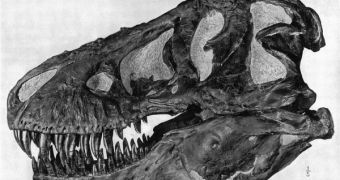Though Tyrannosaurus Rex has been thoroughly studied for several years, very little was known about the way in which it used its sense of smell in "action." While some anthropologists claimed that the small size of the dinosaur's brain was clearly an obstacle in the way of the creature processing too much smell-related information, others argued that the oversize olfactory bulbs the animal's brain had pointed to the contrary.
Recently, a University of Calgary research team published a new study in the Proceedings of the Royal Society B, in which they argued that smell played a determining part in T. Rex's ability to catch and eat its prey. Apparently, the lizard's reputation of being a perfectly-adapted scavenger was not entirely fiction, seeing how only a good nose could have helped the beast follow barely present faint traces from miles away.
According to the paper, the Tyrannosaurus had the best nose of all meat-eating dinosaurs it shared its time line with. "Large olfactory bulbs are found in living birds and mammals that rely heavily on smell to find meat, in animals that are active at night, and in those animals that patrol large areas. Although the king of carnivorous dinosaurs wouldn't have passed on scavenging a free dead meal, it may have used its sense of smell to strike at night or to navigate through large territories to find its next victim," explained Darla Zelenitsky, a paleontologist at the University of Calgary.
Additional discoveries point to the fact that ancient birds not only had a near-perfect sight, but also possessed a keen sense of smell, as evidenced by their olfactory bulbs, which were similar in size to that of theropod-class dinosaurs, such as the T. Rex. The extinct bird Archaeopteryx, which evolved from small carnivorous dinosaurs, had both excellent sight and smell, making it a deadly predator.
"The primitive bird Archaeopteryx had a sense of smell comparable to meat-eating dinosaurs, while at the same time it had very good eye sight. The sense of smell must have become less important at some point during the evolution of those birds more advanced than Archaeopteryx," the paper concluded.

 14 DAY TRIAL //
14 DAY TRIAL //